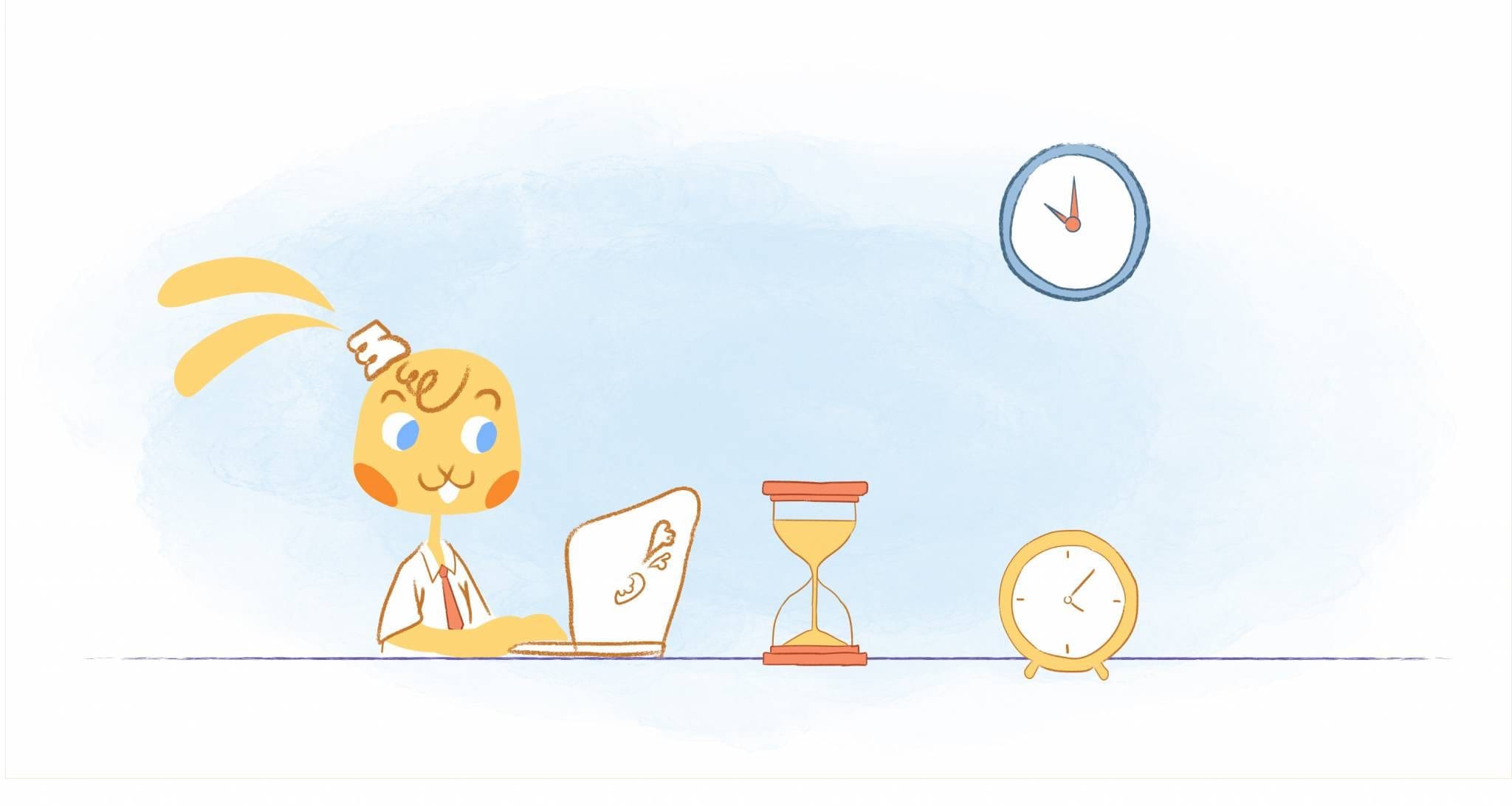

As the calendar turns over to a new year, I’m sure that you want to make the new year as productive and successful as you possibly can. But, that’s just not feasible if your time management skills are lacking.
Before committing to any other resolutions or goals that you have for this year, kick-off things off by improving your time management using these 20 techniques.
1. Run a time audit.
Right now, unless you want to deal with an IRS audit, you’re probably working on your taxes. Or, at the least, you’ve handed them over the person responsible for all of your accounting needs.
Do you know what else deserves to be audited? Your time.
A time audit is simply a way for you to find out how you’re spending your time. You can do this by tracking all of your activities for a week or so. Personally, I feel tracking your time for closer to a month would give you a more accurate figure. But, some time-tracking is better than nothing.
Once you know where your time is being spent, you can find opportunities to spend it more wisely. For example, you may discover that you’re checking your email too often throughout the day. In turn, this time-sucking activity prevents you from spending more time on high-priorities.
If you want to get started, Jory MacKay over at RescueTime has a detailed 5-step plan to run a time audit. But, here’s the jest of it:
- Write down how you would like to spend your time, aka your intentions.
- Use a time tracking tool, like RescueTime, to see how you’re spending time on your computer or phone. You can also use good old pen and paper to take note of offline activities like commuting to work or when you get interrupted.
- Set new goals that aligned with your intentions and how much time you have.
- Adjust your daily schedule to your new goals.
- Have a new system in place to help you keep track of your progress.
2. Write a stop-doing list.
I don’t want to hate on to-do-lists completely. After all, there are psychological and productivity benefits associated with to-do-lists. But, they can also hold you back.
For instance, lists don’t take into account how long it takes you to complete a task. So, let’s say that you have a list of containing ten items that you want to achieve today. The first two tasks end up taking up the majority of your day. As a result, the other eight things don’t get touched. When you notice that, you feel as if you weren’t as productive as you should have been.
What’s more, lists don’t force or motivate you to do things. Just because it’s written on a piece of paper doesn’t mean you’ll get to it if you’re not in the right mindset. Lists can also kill your creativity, and sometimes lists can make activities seem like a chore. Like I love going for a walk with my dog every afternoon. But, having that jotted down on a list makes it feel like an obligation instead of an activity that we both enjoy.
With that in mind, scrap the to-do-list and focus on a “stop-doing list.”
“The start of the New Year is a perfect time to start a stop doing list and to make this the cornerstone of your New Year resolutions, be it for your company, your family, or yourself,” wrote Jim Collins.
If you’re stuck, he suggests that you first ask, What are you deeply passionate about? Collins also recommends that you even ask, What are you are genetically encoded for — what activities do you feel just “made to do”? and What makes economic sense — what can you make a living at?
Answering these questions will help you find balance in your life. And, more importantly, focus on spending time on the things that matter.
3. Plan your schedule around energy levels.
When you ran that time audit, you hopefully noticed that there were certain times when you were most productive. That’s because that’s when you had the most energy. Going forward, make it a point to schedule your most critical or demanding work when you’re at your highest energy peak.
What about less essential tasks or shallow work? Focus on these activities during energy lulls. For example, after lunch, you may feel drowsy. ?instead of trying to force yourself to work on something important, spend that time on tasks like responding to emails or making phone calls.
Also, try to schedule your entire week by your energy levels.
- Mondays are perfect for low-demand tasks, like planning, since you’re coming off the weekend.
- You’re at peak productivity on Tuesdays and Wednesdays. These days should be spent doing your most important or challenging work.
- Energy begins to drop on Thursday, making it a decent day for activities like meetings.
- By Friday, you’re toast. Use this day of the week for things like networking, organizing your office, and planning your schedule.
Related: 9 Ways to Attract Good Energy Today and Every Day
4. Use a calendar app.
Seriously? What are you waiting for? A calendar app is without question, an essential tool you’ll need to manage your time. Without one, it’s impossible to remember everything that needs to get done. Calendars will also send you reminders so that you’ll stop being late or missing deadlines.
One of the “big three,” Google, Outlook, and Apple, should suffice. But also be on the lookout for calendars that meet your unique needs. If scheduling is an issue, then check out Calendar. It’s a nifty tool that uses machine learning to make smart suggestions on scheduling events.
5. Rotate your tasks.
There are several variations of this method. But, in a nutshell, it would work as follows:
- Add your most important tasks to your calendar.
- Block out a specific time for each.
- Work on that task for the allotted time.
- When that time is up, move on to the next item.
- Repeat.
Here’s what I like about this process. It forces you to focus on one task at a time. Also, it breaks-up your day. I don’t know about you. But, doing the same thing all day is tedious and boring.
Most importantly, it keeps you productive. If you know that you only have five minutes to clean out your inbox, then you’re going to use every second of that time block. And, if you didn’t get to all of your emails, you can revisit this task at another time.
6. Work against the clock.
Studies have found that one of the most effective ways to combat procrastination is to work against the clock. It’s similar to the rotating task method. If you only have an hour to get something done, then you’re going to do everything in your willpower to meet that self-imposed deadline.
It’s like when there is under a minute left in a football game, and your favorite team is down by a field goal. They need to use every second to get into field goal distance. That means not wasting precious time on plays that will only gain a yard or two. Instead, the offense will focus on plays that will march them down the field. Even better, receivers will head to the sidelines to stop the clock.
7. Plan ahead.
Benjamin Franklin once said, “By failing to prepare, you are preparing to fail.” And, to me, that’s key to time management.
Open up your calendar and schedule your time. It’s a simple and effective way to make sure that you’re spending the right amount of time on the right activities. Furthermore, it protects your time and helps you avoid scheduling conflicts.
Ideally, you should do this on a Friday afternoon or Sunday evening. But, to get the year started on the right foot, start filling out your calendar right now. Do you already have appointments, deadlines, social obligations, or a business trip planned for the upcoming year? Block them out before something else takes their place.
8. Schedule procrastination breaks.
There you are hard at work. You know that you have a deadline to meet. But, your mind begins to wonder. There’s a good reason for this. Your brain needs a break.
As opposed to fighting against this, allow yourself to get distracted. That may sound counterproductive. But, distractions can be a good thing as they can help ease pain and control impulses.
Of course, this doesn’t give you the excuse to goof all day. But, you have blocks of time in your schedule to temporarily indulge yourself in a time-wasting activity. So, you could work for an hour and then take a 15-minute break. That break could be used to scroll through Instagram, stare out the window, or plan your family’s annual vacation.
However, once that time is up, you need to get back to the grind.
9. Prioritize your work.
Not all tasks are created equal. That’s why you need to stop devoting your precious time and energy to less critical objectives. And, the best way to do that is by prioritizing your tasks.
I know it’s easier said than done. But it’s not impossible. Ideally, you should focus on the things that push you closer to achieving your goals or anything that is time-specific.
That may seem to board. So, I’ve come up with 25 tips for optimal time prioritization that you should check out if this struggle is real.
10. Keep distractions at bay.
Do you know what is inevitable in life beyond death and taxes? Distractions.
You can be confident that throughout the day, you’ll get sidetracked by an email notification, phone call, or knock on your door. Since these can’t always be eliminated, your best course of action is to minimize them as much as possible.
For instance, block apps at certain times or turn off your phone when focused on deep work. Have specific hours for unscheduled walk-ins. And, keep a distraction log to see what and when interrupts you. If you notice that you get hangry at a particular time, then stock-up with healthy snacks to fight back against this feeling.
11. Make your well-being a priority.
Every year we make resolutions geared towards our health and well-being. Guess what? We never follow through with them.
Often this is because these goals are too unrealistic and vague. We also fail to create actionable steps to achieve resolutions.
That’s all well and good. But, what does that have to do with time management?
If you’re tired and feel like trash, then how are you going to be productive? Will have the energy and stamina to power through the day. Will you have enough focus to stay on-track with priorities? And, if you don’t alleviate your stress and anxiety, then you’re going to burn yourself out.
So, yeah. Your well-being needs to become a priority.
To guarantee that you accomplish this, start small. Go for a 15-minute walk after lunch. Eventually, make that 30-minutes. Pack your lunch instead of hitting up your local pizzeria. And, have a consistent bed and wake-up time.
Most importantly, block out times in your calendar to attend to your well-being. That daily walk you take? Block it in your calendar so that you don’t schedule anything else at that time.
Related: Why Well-being, Wellness, and Mental Well-being Should Be Part of Your Daily Dialogue
12. Eliminate “half-work.”
“In our age of constant distraction, it’s stupidly easy to split our attention between what we should be doing and what society bombards us with,” writes James Clear.
“Usually, we’re balancing the needs of messages, emails, and to-do lists at the same time that we are trying to get something accomplished. Rarely, we are fully engaged in the task at hand.”
James calls this “half-work.”One example would be stopping your work to check for no reason. Another would be starting a new workout regiment and switching to a new program a couple of days later.
“Regardless of where and how you fall into the trap of half–work, the result is always the same: you’re never fully engaged in the task at hand, you rarely commit to a task for extended periods, and it takes you twice as long to accomplish half as much,” explains Clear.
The best way to overcome half-work is to block “out significant time to focus on one project and eliminate everything else.”
13. Delegate or outsource tasks.
I’ve talked about this ad nauseam. But, it’s a surefire way to regain time. I mean, let’s say you want to start a podcast this year? How much time are you going to waste creating an intro or editing the episode? You could pay someone on Fiverr to do this for you. It’s pretty affordable and leaves you with more time to record the best show possible.
Keep in mind though, just because you’ve delegated or outsourced a task doesn’t mean you should forget all about it. Keep it on your list or calendar until you’ve received confirmation that it’s been completed.
14. Train your brain.
Did you know that you can train your brain like any other muscle? One such exercise that you should try is to improve your focus and concentration. Let’s say that you’re you’ve been working for 45-minutes straight and feel that you must take a break. Push yourself to 50-minutes next week. And, then the following week go up to 60-minutes.
15. Find a partner in crime.
Imagine that you just joined a gym. How much more motivated are you to go when you have a friend tagging along? Not only does it make the experience more enjoyable, but you can also push each to go when one of you isn’t feeling it.
You can use that same concept with time management. You could have an assistant to remind you to be more punctual, like when to leave for a meeting. When working on a project, encourage team members to check in with each other to make sure everyone is on track.
16. Make the most of “gap” times.
An example of a “gap” time would be your daily commute. Let’s say that you take public transportation. Instead of people-watching your fellow passengers or watching a TV on your phone, spend that time more productively. For instance, you could clean out your inbox, update your social accounts, or confirm a meeting that’s scheduled for this afternoon.
17. Change your life this year with keystone habits.
Want to transform your life? Implement keystone habits this year.
Developed by Charles Duhigg, author of “The Power of Habit,” these are healthy habits that correlate with each other and help you drop bad habits. One example would be exercising. It often goes hand-in-hand with tracking what you eat. Other examples would be meditation, planning out your days, and spending quality time with loved ones.
18. Automate decisions.
Personally, this has been life-changing for me. I used to wake-up and spend five-minutes or so deciding what to wear for the day. That doesn’t sound like much. But, it adds-up over time — especially when adding other less important decisions like figure out what to eat.
I now lay out my clothes the night before. Heck. I may even decide on my wardrobe for the entire week. I’ve also gotten pretty good at having a signature look like Zuckerberg used to with his hoodie and jean outfit. The same is true with my meals for the week and queuing everything from books to podcasts.
As an added perk, it also reserves your mental energy so that it can be used for the more important stuff.
Related: 6 Ways to Make Hard Decisions Easier as a Leader
19. Stand up to “time bullies.”
What’s the best way to deal with a bully? Stand up to them.
I’m not advocating violence here. You could ignore them, crack a joke, or tell them to stop. Another option would be to avoid them altogether. If you know where bullies hanging out, then don’t go in that direction like Dale and Brennan do in Step Brothers.
But, what exactly are time bullies?
Well, they could be an employee or client that doesn’t respect boundaries, like calling you when you’re off the clock. It could be those annoying Facebook notifications you receive on your smartphone. Or, it’s those people who aren’t respectful of your time. You know, the folks who show up late to a meeting or ask, “Do you have a minute?” only to waste an hour of your time.
How you deal with these bullies will vary. But, here are some exercises to try out in the new year:
- Get comfortable saying, “no.” If you’re busy or enjoying your personal time, let the other person know that you don’t have time for them right now. Offer them an alternative time to chat or meet when you have the availability.
- Stop hanging out with toxic people. If someone has a reputation for not respecting your time, then stop giving them the benefit of the doubt. That client who is always calling you? You may want to ask if it’s worth continuing to work them? An employee who shows up late to work? You may want to let them go.
- On your calendar, block out your priorities. Whether if it’s when you don’t want to be disturbed at work or want to enjoy your personal time, block these out. Now when you share your calendar, people will see when you’re free and when you’re not.
- Remove distracting apps from your phone. I uninstalled Facebook on my phone. And it’s been great. I don’t have to worry about blocking it at certain times or turning off my phone. If I do need to visit the site, I have to logon, which has saved me a ton of time.
20. Be more selective.
Finally, be more selective with how you spend your time this year. Sure. Some people may accuse you of being picky or snobby. But it’s your time. Not theirs.
I’ll give you an example. In December, I was invited to several holiday functions. Although I was swamped trying to wrap-up my end-of-year work obligations, I decided to enjoy the festivities. However, instead of attending every event, I narrowed my choices down.
Not attending every single party was easier then I thought. The annual family party was a give-in. Another was catching-up with a friend who only comes back to town during the holidays. As for the rest? I politely turned them down because I wasn’t amped about attending them like these other events.











John Rampton
John’s goal in life is to make people’s lives much more productive. Upping productivity allows us to spend more time doing the things we enjoy most. John was recently recognized by Entrepreneur Magazine as being one of the top marketers in the World. John is co-founder of Calendar.